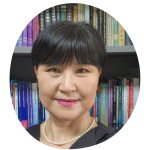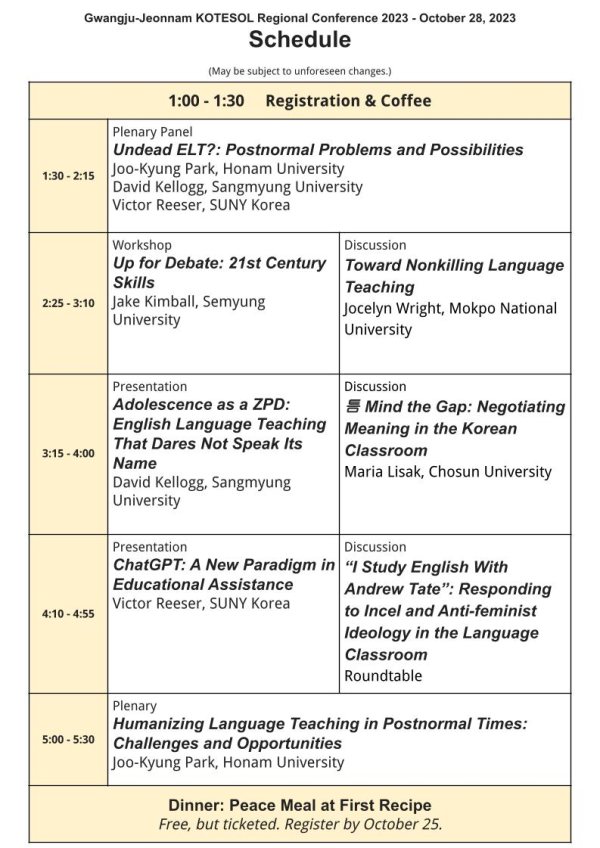Navigation: Conference overview | Conference schedule | Pre-registration form
Schedule
(Subject to unforeseen changes)
13:00–13:30 Registration & Coffee
13:30–14:15 Plenary Panel Session
Undead ELT?: Postnormal Problems and Possibilities
— Joo-Kyung Park, Honam University
— David Kellogg, Sangmyung University
— Victor Reeser, SUNY Korea
14:30–15:15 Workshop
Up for Debate: 21st Century Skills
— Jake Kimball, Semyung University
14:30–15:15 Discussion
Toward Nonkilling Language Teaching
— Jocelyn Wright, Mokpo National University
15:15–16:00 Presentation
Adolescence as a ZPD: English Language Teaching That Dares Not Speak Its Name
— David Kellogg, Sangmyung University
15:15–16:00 Discussion
틈 Mind the Gap: Negotiating Meaning in the Korean Classroom
— Maria Lisak, Chosun University
16:10–16:55 Presentation
ChatGPT: A New Paradigm in Educational Assistance
— Victor Reeser, SUNY Korea
16:10–16:55 Discussion
“I Study English With Andr*w T*te”: Responding to Incel and Anti-f*minist Ideology in the Language Classroom
— Roundtable
17:00–17:30 Plenary
Humanizing Language Teaching in Postnormal Times: Challenges and Opportunities
— Joo-Kyung Park, Honam University
13:30–14:15 Plenary Panel Session
Undead ELT?: Postnormal Problems and Possibilities
— Joo-Kyung Park, Honam University
— David Kellogg, Sangmyung University
— Victor Reeser, SUNY Korea
'Postnormal times' was defined by Ziauddin Sardar (2010) as "an in-between period where old orthodoxies are dying, new ones have yet to be born, and very few things seem to make sense." We found this term apt for our conference this year as it seems to describe some of the questions confounding English language teachers in 2023. In this conference-opening plenary panel session, our three invited speakers will help us explore some of these pressing issues. What does the rise of artificial intelligence, and especially language-focused AI such as ChatGPT, mean for language teachers and learners? Why is the very traditional grammar-translation method still so dominant in language education in Korea, despite decades of efforts to move towards more communicative and learning-centered approaches? What kind of challenges do education policymakers face, and will we see developments in the relationship between official education policies and actual classroom practices? And, where do English language teachers themselves fit in all of this? We aim to delve into questions like these as well as audience questions, learn from our expert speakers, and kick off our conference in a spirit of curiosity and reflection.

Dr. Joo-Kyung Park is a Full Professor in the Department of English Language at Honam
University, Gwangju, South Korea. Her research interests include teacher education, critical
pedagogy, English as a lingua franca, intercultural communication and teacher well-being as
a recent addition. She has been frequently invited to deliver keynote, plenary and featured
talks at ELT conferences held both within and beyond Korea. She has served as the journal
editor-in-chief for Korea TESOL and the Global English Teachers’ Association, and as an
editorial board member of numerous Korean and overseas journals. She was president of
Korea TESOL (1996–1997) and the Applied Linguistics Association of Korea (ALAK;
2015–2016). Currently, she serves as the co-president of the Asian Association of Teachers
of English as a Foreign Language (AsiaTEFL) (2022-2024). Email: english58@hanmail.net

David Kellogg has taught in East Asia since 1984 and in Korea since 1997. He has an MA (with distinction) in applied linguistics from the University of Essex and a PhD (vice-chancellor’s special award) in general linguistics from Macquarie University. He has published over twenty-five books and seventy articles on the cultural-historical psychology of Vygotsky and the systemic-functional linguistics of Halliday, and is now a research professor at Sangmyung University in Seoul.

Victor Reeser is a teaching professor for SUNY Korea’s English Language Program and the KOTESOL MCALL SIG Facilitator. Originally from Oregon, USA, he has been living in Asia and working in language education since 2009. He is currently a PhD candidate at Incheon National University studying cognitive linguistics.
Reference
Sardar, Z. (2010). "Welcome to postnormal times". Futures. 42(5): 435–444. doi:10.1016/j.futures.2009.11.028
14:30–15:15 Workshop
Up for Debate: 21st Century Skills
— Jake Kimball, Semyung University
An ever-changing and competitive society expects our learners to develop the four Cs if they are
to be successful: communication, collaboration, critical thinking, and creativity. In addition, we
can add problem-solving, IT literacy, inter and intra-personal skills, time management,
adaptability, cultural awareness, and many others to the list. Indeed, these are all core
competencies worth fostering in students. However, research shows that there is a gap between
the theory and the practice of implementing these core competencies in the classroom. It is no
easy task, especially given the target language and subskills that also need attention.
In this workshop, we will work in teams, modeling 21st-century skills ourselves, to debate the
feasibility of implementing them in the classroom curriculum in 2023 and beyond. Participants
will be given a series of statements, time to bolster an argument, and an opportunity to articulate
their position.

Jake Kimball holds an MSc in educational management in TESOL from Aston University, and his research interests include program evaluation and classroom dynamics. He is especially interested in classroom management issues that impact willingness to communicate (WTC) and demotivation. Taking part in teacher development activities has been a long-time interest. He is an assistant professor of English in the Liberal Arts Department of Semyung University in Korea.
14:30–15:15 Discussion
Toward Nonkilling Language Teaching
— Jocelyn Wright, Mokpo National University
Did the title of this presentation stop you? Luckily, your heart is still beating. Not everyone gets to live. Are you thinking, the opposite of nonkilling is … killing? Fortunately, your mind is following. But what are you feeling? Explore those emotions. Feelings make you fully human. Reflect on your past. Have your language studies and education been truly humanizing? In what ways? How not? And now, how about your language teaching? The movement in the title of this talk provocatively presumes there is something negative that can be identified as ‘killing language teaching’ and that we can strive for a positive alternative. If curious to engage further, join this discussion session where we explore the context of nonkilling and connections with our work, collectively reflect on the topic through silent mindmapping, asking deep questions, and interactive debriefings. It is hoped participants will leave this session with profound new insights.

Jocelyn Wright is Associate Professor in the Department of English Language and Literature at Mokpo National University in South Korea. She is an active member of Gwangju-Jeonnam KOTESOL. Her interests include matters at the heart of the intersecting fields of peace linguistics, peace (language) education, and peace literature.
15:15–16:00 Presentation
Adolescence as a ZPD: English Language Teaching That Dares Not Speak Its Name
— David Kellogg, Sangmyung University
Vygotsky’s “zone of proximal development”, contrary to popular belief, does not refer to scaffolding or any other teaching technique: it was a diagnostic device designed to show what a student’s next or “proximal” stage of development might be. This doesn’t mean that the ZPD lacks pedagogical implications: it means that learning must lead and not follow maturation. Parents, for example, often wait for puberty before any talk of sex. As a result, sex education in South Korea presents a national and not simply a classroom embarrassment: the country’s entirely non-consensual education about “consent” has now been condemned by Human Rights Watch and our gender equality gap is largest in the OECD. In this talk, I first present three apparently contradictory rules that Vygotsky laid out for a zone of proximal sexual development. I will then present materials—piloted with very willing Korean learners—that show how English language teaching can square the circle.

David Kellogg has taught in East Asia since 1984 and in Korea since 1997. He has an MA (with distinction) in applied linguistics from the University of Essex and a PhD (vice-chancellor’s special award) in general linguistics from Macquarie University. He has published over twenty-five books and seventy articles on the cultural-historical psychology of Vygotsky and the systemic-functional linguistics of Halliday, and is now a research professor at Sangmyung University in Seoul.
15:15–16:00 Discussion
틈 Mind the Gap: Negotiating Meaning in the Korean Classroom
— Maria Lisak, Chosun University
This presentation looks at the spooky spaces in-between. In between digital skills differences, in between English language proficiency differences. Between gender, place of residence, school affiliation, and even military service. The teacher practitioner has found these differences to be gaps or divides between their Korean university students. No learner is one size fits all and some of the differences between learners can be culturally nuanced and silently deadly to learner well-being and confidence. This presentation is a chance to discuss some of the difficulties teachers are having in their classrooms that are culturally, systemically, or structurally created. By looking at the Korean educational environment for its cosmopolitanism, specifically its proper distance negotiation or how to make meaningful exchanges between people with different perspectives, the participants work together and share their stories offering advice and support to each other. Using the Korean word Teum 틈, the teacher researcher looks at the (im)proper distance between their Korean learners and shares some classroom stories of how learners’ cosmopolitan imagination has actually helped to overcome the gap in-between. This presentation is part of a larger body of study on Korean cosmopolitan motifs and Korea-as-Method theorizing attempts. The presenter welcomes participants to share their experiences and thoughts.

Maria Lisak creates safe environments to encourage and support learners for risk-taking and growth. Currently at Chosun University in South Korea, her career spans 27 years. She has diplomas and certificates in business, technology, education and meditation. She is a lifetime member with KOTESOL and AsiaTEFL. Her research interests include funds of knowledge, cosmopolitan literacies and autoethnography.
16:10–16:55 Presentation
ChatGPT: A New Paradigm in Educational Assistance
— Victor Reeser, SUNY Korea
Educators face the constant challenge of efficiently managing their time while delivering high-quality learning experiences. The rise of AI, specifically conversational agents like ChatGPT, offers promising solutions to augment teaching practices. This presentation aims to explore how ChatGPT can act as a virtual teaching assistant, assisting educators in a variety of tasks like drafting quiz questions, generating activity ideas targeting specific language skills, providing instant feedback, and even helping with administrative tasks. We'll delve into case studies and provide actionable insights for implementing ChatGPT in the classroom.

Victor Reeser is a teaching professor for SUNY Korea’s English Language Program and the KOTESOL MCALL SIG Facilitator. Originally from Oregon, USA, he has been living in Asia and working in language education since 2009. He is currently a PhD candidate at Incheon National University studying cognitive linguistics.
16:10–16:55 Discussion
“I Study English With Andr*w T*te”: Responding to Incel and Anti-f*minist Ideology in the Language Classroom
— Roundtable
The rise of incel ("involuntarily celibate") and anti-fem*nist ideologies presents unique challenges for English language educators. In Korea and around the world, these discourses have gained prominence with adolescent boys in particular, and controversial figures such as Andr*w T*te hold a lot of influence over some of our learners. This roundtable discussion session offers space for attendees to share their experiences and unpack this social phenomenon and the ways it is impacting our learners and our classrooms. We will discuss questions such as: How do language teachers respond when students share these viewpoints in the classroom? Do we have a responsibility to combat harmful beliefs? What responsibility do we have to other students when these viewpoints are expressed? The session aims to provide a collaborative space for educators to connect and share, reflect on challenges, and develop strategies. Please come ready to share, listen, and discuss constructively as we tackle this sensitive yet critical issue in the current language classroom.

This is a roundtable session designed to be very attendee-centric. The session will be moderated by Gwangju-Jeonnam KOTESOL chapter president Bryan Hale, but we will aim for all attendees to have an opportunity to both speak and listen. This session aims to be a safe and respectful space for sharing and discussion. Please see the KOTESOL Code of Conduct.
17:00–17:30 Plenary
Humanizing Language Teaching in Postnormal Times: Challenges and Opportunities
— Joo-Kyung Park, Honam University
It is said that postnormal times are characterized by uncertainty, complexity, and ambiguity.
English language teaching (ELT) in postnormal times has its own characteristics, challenges
and opportunities that are shaped by them in this rapidly changing world. Challenged and
often threatened by new technology and AI-based language teaching and learning,
humanizing language teaching in postnormal times involves identifying the unique
challenges and opportunities in order to meet the evolving needs of learners and to ensure
inclusivity, effectiveness, and sustainability. In this plenary talk, major characteristics,
challenges, and opportunities specific to ELT in postnormal times are discussed, including
those related to technology and global communication opportunities in terms of access,
equity, and quality. Some suggestions are also provided on how to be innovative and
responsive to the changing world, with examples from the speaker’s own life path as an ELT
professional to illustrate how the power of professional networks, leadership, and service
can be harnessed to navigate postnormal times effectively and channeled into the
development of individuals and organizations.

Dr. Joo-Kyung Park is a Full Professor in the Department of English Language at Honam
University, Gwangju, South Korea. Her research interests include teacher education, critical
pedagogy, English as a lingua franca, intercultural communication and teacher well-being as
a recent addition. She has been frequently invited to deliver keynote, plenary and featured
talks at ELT conferences held both within and beyond Korea. She has served as the journal
editor-in-chief for Korea TESOL and the Global English Teachers’ Association, and as an
editorial board member of numerous Korean and overseas journals. She was president of
Korea TESOL (1996–1997) and the Applied Linguistics Association of Korea (ALAK;
2015–2016). Currently, she serves as the co-president of the Asian Association of Teachers
of English as a Foreign Language (AsiaTEFL) (2022-2024). Email: english58@hanmail.net



